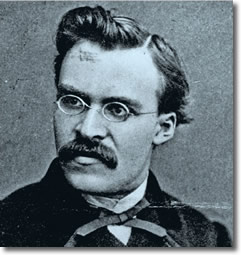Regulars might recall how, during the Rad days of Nietzsche (last fall) .. I kept making vague references to how Nietzsche's insanity might actually (somehow) confirm the validity of his ideas .. rather than discredit them.
 The problem here is that this notion is counter-intuitive, no? If a controversial intellectual goes crazy, would it not seem reasonable that a little of his nascent insanity might've infected his earlier works .. thus discrediting them?
The problem here is that this notion is counter-intuitive, no? If a controversial intellectual goes crazy, would it not seem reasonable that a little of his nascent insanity might've infected his earlier works .. thus discrediting them?
To be honest, I am not clear myself on how my counterintuitive notion might be true. The 'feeling' comes as an intuition (.. if you believe in such things). A hunch. A vague impression.
In Nietzsche's case however .. I feel his insanity is different (perhaps) because of the topics he covered, one of which is » morals, which can transcend the intellect.
In reading him, I find the man obviously intelligent, occasionally brilliant, with a remarkably keen insight. In MOST of his thought-processes, I detect NO hint of insanity. (Whatsoever.)
But in other areas .. yeah, not difficult to believe this stuff was written by a guy starting to lose his mind.
So his mental stability seems to be context-sensitive. (Tho I have not analyzed his writings closely enough to determine where exactly the dividing lines of these contexts might lie.)
 Again, my thoughts here seem to be consulting my intuition .. which is not the most reliable communications interface. In other words, my gut is telling me something that my head cant quite grasp. (Not fully. Not yet, anyway.)
Again, my thoughts here seem to be consulting my intuition .. which is not the most reliable communications interface. In other words, my gut is telling me something that my head cant quite grasp. (Not fully. Not yet, anyway.)
» Dangerous Knowledge (BBC Video)
My point today involves a video titled » Dangerous Knowledge (BBC) .. which looks at the lives of .. four brilliant mathematicians:
- Georg Cantor ("god's messenger," a german who successfully dissected INFINITY where others such as galileo had failed)
- Ludwig Boltzmann ("the genius of disorder," an austrian physicist who looked at TIME & ENTROPY in new and disturbing ways)
- Kurt Gödel ("the limits of logic," greatest logician ever, who was a close friend of einstein and famous for his incompleteness theorem)
- Alan Turing ("the enigma," father of COMPUTER SCIENCE, an unapologetic gay who was chemically castrated by the british government .. for being gay)
".. whose genius has profoundly affected us, but which tragically drove them INSANE and eventually led to them all committing SUICIDE."
The above quote comes directly from the DK website, which is interesting .. cuz Cantor didnt kill himself. [ Rather he merely died alone in an insane asylum. =/ You can watch the entire video » here. ]
 To be sure, this video is a trip. One of its recurring themes is » uncertainty. Which means our physical world (in which we live) operates on probabilities (not certainty) .. especially when you try to predict how matter will operate at the atomic and subatomic levels.
To be sure, this video is a trip. One of its recurring themes is » uncertainty. Which means our physical world (in which we live) operates on probabilities (not certainty) .. especially when you try to predict how matter will operate at the atomic and subatomic levels.
This concept should not be too surprising, tho, since tomorrow is promised to no man. There exists no certainty that you or I will wake tomorrow. Merely a probability (.. that we can venture to calculate).
The concept of 'uncertainty' initially made those who saw it most clearly feel ill-at-ease. Even Einstein had trouble with it .. leading him to famously quip » "God does not play dice with the universe."
There's a reason the subject of heaven is rarely a topic of scientific research. (It's not physical.) "So, at least," reasoned these great minds, "let's try to find some certainty here in our physical world."
Not only was that certainty NOT coming .. but the most brilliant minds could see that it was NEVER coming. Ever. You could kiss the idea of certainty goodbye. In reality, it's just an illusion.
This is kinda WHY these guys went crazy. They saw things (using their super-powerful minds). Things like infinity & eternity. But what's really weird .. is that they started out trying to prove the EXACT OPPOSITE. They started out searching for certainty. (Think about it.)
••• today's entry continues here below •••
Not only did they fail to come up with the 'evidence' they were looking for .. but they actually discovered that this evidence would NEVER be found. They could see that looking further was a waste of time.
The best image I know that captures this idea .. of how our physical world looks .. given the implications of the mathematical discoveries presented in this video .. is the floating tree. Think about it. We have no physical certainty under our feet. Our world is literally something like that image. (I set this image as my new desktop background.)
At t=5:40 of the lower/bottom video, you'll find this quote:
As the Austrian writer Musil wrote at the time » "Suddenly mathematicians, those working in the innermost region, discovered that something in the foundations could absolutely NOT be put in order. Indeed, they took a look at the bottom and found that the whole edifice was standing on air."
 » Still True (Mathematically) Despite Insanity
» Still True (Mathematically) Despite Insanity
I said all that to say this » at t=01:20, the author (david malone) says:
This film is about how a small group of the most brilliant minds unraveled our old cozy certainties about maths and the universe. It is also about how once they had looked at these problems, they could not look away (cue violins) ..
.. and pursued the questions to the brink of insanity and then over it .. to madness and suicide. But for all their tragedies, WHAT THEY SAW IS STILL TRUE.
When I heard that, I said, "Nietzsche!" See it?
If their ideas (.. which we KNOW are valid, mathematically speaking) drove them insane .. then it is at least possible that Nietzsche's ideas (which seem to have drove him crazy, too) were ALSO valid.
Of course this proves nothing. It doesnt prove my intuition was correct. Rather it disproves the opposite .. the notion that Nietzsche's ideas (.. if they did in fact drive him crazy) must necessarily be invalid. Right? Which means I (my intuition) could possibly be correct.
Just because somebody happens to go crazy .. doesnt means their ideas are necessarily invalid .. that they are somehow tainted. For this concept I now have supporting evidence (based on provable mathematics).
[ What's really a trip, tho .. is that there appears to be a fractal-like pattern of repeating .. which suggests that the insights we glean at any one level .. is naturally true as you come up to larger/higher levels .. at least, to a point.
So you could (in theory anyway) use the insights you observe at a subatomic level to draw inferences about our conscious world. And when you do that, you find a world that (eerily) resembles Eastern mysticism. But this is another topic entirely. ]
THIS is the book, by the way, that got me started on this track (.. of looking into 'dangerous knowledge' .. the kind that leads brilliant thinkers to the brink of insanity & suicide). I think Nigel (New Zealand) was the one who first mentioned the title. It won the Pulitzer in 1980. Insightful commentary » here.
For more along these lines, here's a Google search preconfigured for the query » friedrich nietzsche insanity
